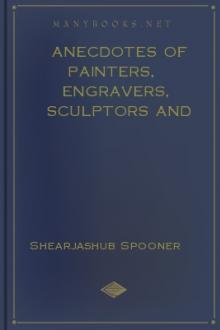Anecdotes of Painters, Engravers, Sculptors and Architects, and Curiosities of Art - Shearjashub Spooner (best fiction books to read .TXT) 📗

- Author: Shearjashub Spooner
- Performer: -
Book online «Anecdotes of Painters, Engravers, Sculptors and Architects, and Curiosities of Art - Shearjashub Spooner (best fiction books to read .TXT) 📗». Author Shearjashub Spooner
As immediate death might have been the consequence of this act of indiscretion, his family, who were scarcely less interested for a life so precious, than for the soul which was the object of their pious apprehensions, gave up the point altogether; and on account of the vehemence with which Salvator spoke on the subject, and the agitation it had occasioned, they carefully avoided renewing a proposition which had rallied all his force of character and volition to their long abandoned post.
The rejection of a ceremony which was deemed in Rome indispensably necessary to salvation, by one who was already stamped with the church's reprobation, soon spread; report exaggerated the circumstance into a positive expression of infidelity; and the gossip of the Roman ante-rooms was supplied for the time with a subject of discussion, in perfect harmony with their love for slander, bigotry, and idleness.
"As I went forth from Salvator's door," relates the worthy Baldovini, "I met the Canonico Scornio, a man who has taken out a license to speak of all men as he pleases. 'And how goes it with Salvator?' demands this Canonico of me. 'Bad enough, I fear.'—Well, a few nights back, happening to be in the anteroom of a certain great prelate, I found myself in the centre of a circle of disputants, who were busily discussing whether the aforesaid Salvator would die a Schismatic, a Huguenot, a Calvinist, or a Lutheran?—'He will die, Signor Canonico,' I replied, 'when it pleases God, a better Catholic than any of those who now speak so slightingly of him!'—and so pursued my way."
This Canonico, whose sneer at the undecided faith of Salvator roused all the bile of the tolerant and charitable Baldovini, was the near neighbor of Salvator, a frequenter of his hospitable house, and one of whom the credulous Salvator speaks in one of his letters as being "his neighbor, and an excellent gentleman."
On the following day, as the Padre sat by the pillow of the suffering Rosa, he had the simplicity, in the garrulity of his heart, to repeat all these idle reports and malicious insinuations to the invalid: "But," says Baldovini, "as I spoke, Rosa only shrugged his shoulders."
Early on the morning of the fifteenth of March, that month so delightful in Rome, the anxious and affectionate confessor, who seems to have been always at his post, ascended the Monte della Trinità, for the purpose of taking up his usual station by the bed's head of the fast declining Salvator. The young Agosto flew to meet him at the door, and with a countenance radiant with joy, informed him of the good news, that "his dear father had given evident symptoms of recovery, in consequence of the bursting of an inward ulcer."
Baldovini followed the sanguine boy to Iris father's chamber; but, to all appearance Salvator was suffering great agony. "How goes it with thee, Rosa?" asked Baldovini kindly, as he approached him.
"Bad, bad!" was the emphatic reply. While writhing with pain, the sufferer added after a moment:—"To judge by what I now endure, the hand of death grasps me sharply."
In the restlessness of pain he then threw himself on the edge of the bed, and placed his head on the bosom of Lucrezia, who sat supporting and weeping over him. His afflicted son and friend took their station at the other side of the couch, and stood in mournful silence watching the issue of these sudden and frightful spasms. At that moment a celebrated Roman physician, the Doctor Catanni, entered the apartment. He felt the pulse of Salvator, and perceived that he was fast sinking. He communicated his approaching dissolution to those most interested in the melancholy intelligence, and it struck all present with unutterable grief. Baldovini, however, true to his sacred calling, even in the depth of his human affliction, instantly despatched the young Agosto to the neighboring Convent della Trinità, for the holy Viaticum. While life was still fluttering at the heart of Salvator, the officiating priest of the day arrived, bearing with him the holy apparatus of the last mysterious ceremony of the church. The shoulders of Salvator were laid bare, and anointed with the consecrated oil; some prayed fervently, others wept, and all even still hoped; but the taper which the Doctor Catanni held to the lips of Salvator while the Viaticum was administered, burned brightly and steadily! Life's last sigh had transpired, as religion performed her last rite.
Between that luminous and soul-breathing form of genius, and the clod of the valley, there was now no difference; and the "end and object" of a man's brief existence was now accomplished in him who, while yet all young and ardent, had viewed the bitter perspective of humanity with a philosophic eye and pronounced even on the bosom of pleasure,
"Nasci pœna—Vita labor—Necesse mori."
On the evening of the fifteenth of March, 1673, all that remained of the author of Regulus, of Catiline, and the Satires—the gay Formica, the witty Coviello—of the elegant composer, and greatest painter of his time and country—of Salvator Rosa! was conveyed to the tomb, in the church of Santa Maria degli Angioli alle Terme—that magnificent temple, unrivalled even at Rome in interest and grandeur, which now stands as it stood when it formed the Pinacotheca of the Thermæ of Dioclesian. There, accompanied by much funeral pomp, the body of Salvator lay in state; the head and face, according to the Italian custom, being exposed to view. All Rome poured into the vast circumference of the church, to take a last view of the painter of the Roman people—the "Nostro Signor Salvatore" of the Pantheon; and the popular feelings of regret and admiration were expressed with the usual bursts of audible emotions in which Italian sensibility on such occasions loves to indulge. Some few there were, who gathered closely and in silence round the bier of the great master of the Neapolitan school; and who, weeping the loss of the man, forgot for a moment even that genius which had already secured its own meed of immortality. These were Carlo Rossi, Francesco Baldovini, and Paolo Oliva, each of whom returned from the grave of the friend he loved, to record the high endowments and powerful talents of the painter he admired, and the poet he revered. Baldovini retired to his cell to write the Life of Salvator Rosa, and then to resign his own; Oliva to his monastery, to compose the epitaph which is still read on the tomb of his friend; and Carlo Rossi to select from his gallery such works of his beloved painter, as might best adorn the walls of that chapel, now exclusively consecrated to his memory.
On the following night, the remains of Salvator Rosa were deposited, with all the awful forms of the Roman church, in a grave opened expressly in the beautiful vestibule of Santa Maria degli Angioli alle Terme. Never did the ashes of departed genius find a more appropriate resting place;—the Pinacotheca of the Thermæ of Dioclesian had once been the repository of all that the genius of antiquity had perfected in the arts; and in the vast interval of time which had since elapsed, it had suffered no change, save that impressed upon it by the mighty mind of Michael Angelo.—Lady Morgan.
DOMENICHINO.This great artist is now universally esteemed the most distinguished disciple of the school of the Caracci, and the learned Count Algarotti prefers him even to the Caracci themselves. Poussin ranked him next after Raffaelle, and Passeri has expressed nearly the same opinion. He was born at Bologna in 1581, and received his first instruction from Denis Calvart, but having been treated with severity by that master, who had discovered him making a drawing after Annibale Caracci, contrary to his injunction, Domenichino prevailed upon his father to remove him from the school of Calvart, and place him in the Academy of the Caracci, where Guido and Albano were then students.
THE DULLNESS OF DOMENICHINO IN YOUTH.The great talents of Domenichino did not develop themselves so early as in many other great painters. He was assiduous, thoughtful and circumspect; which his companions attributed to dullness, and they called him the Ox; but the intelligent Annibale Caracci, who observed his faculties with more attention, testified of his abilities by saying to his pupils, "this Ox will in time surpass you all, and be an honor to the art of painting." It was the practice in this celebrated school to offer prizes to the pupils for the best drawings, to excite them to emulation, and every pupil was obliged to hand in his drawing at certain periods. It was not long after Domenichino entered this school before one of these occasions took place, and while his fellow-students brought in their works with confidence, he timidly approached and presented his, which he would gladly have withheld. Lodovico Caracci, after having examined the whole, adjudged the prize to Domenichino. This triumph, instead of rendering him confident and presumptuous, only stimulated him to greater assiduity, and he pursued his studies with such patient and constant application, that he made such progress as to win the admiration of some of his cotemporaries, and to beget the hatred of others. He contracted a friendship with Albano, and on leaving the school of the Caracci, they visited together, Parma, Modena, and Reggio, to contemplate the works of Correggio and Parmiggiano. On their return to Bologna, Albano went to Rome, whither Domenichino soon followed him, and commenced his bright career.
The student may learn a useful lesson from the untiring industry, patience, and humility of this great artist. Passeri attributes his grand achievements more to his amazing study than to his genius; and some have not hesitated to deny that he possessed any genius at all—an opinion which his works abundantly refute. Lanzi says, "From his acting as a continual censor of his own productions, he became among his fellow pupils the most exact and expressive designer, his colors most true to nature, and of the best impasto, the most universal master in the theory of his art, the sole painter amongst them all in whom Mengs found nothing to desire except a little more elegance. That he might devote his whole being to the art, he shunned all society, or if he occasionally sought it in the public theatres and markets, it was in order better to observe the play of nature's passions in the features of the people—those of joy, anger, grief, terror, and every affection of the mind, and commit it living to his tablets. Thus it was, exclaims Bellori, that he succeeded in delineating the soul, in coloring life, and raising those emotions in our breasts at which his works all aim; as if he waved the same wand which belonged to the poetical enchanters, Tasso and Ariosto."
DOMENICHINO'S SCOURGING OF ST. ANDREW.Domenichino was employed by the Cardinal Borghese, to paint in competition with Guido, the celebrated frescos in the church of S. Gregorio at Rome. Both artists painted the same subject, but the former represented the Scourging of St. Andrew, and the latter St. Andrew led away to the Gibbet. Lanzi says it is commonly reported that an aged woman, accompanied by a little boy, was seen long wistfully





Comments (0)